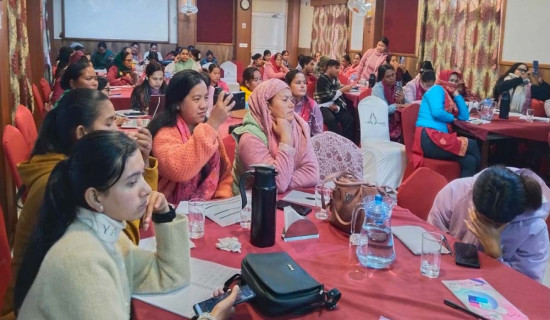- Thursday, 25 December 2025
Peace Keeps War Away: Tribute To Ela Bhatt
There are very few people who have achieved as much as Ela Bhatt, a Gandhian leader who passed away on 2nd Nov 2022. When her death was made public, people all over the world, especially poor women for whom her life was dedicated to, went on mourning and are still offering prayers for her soul to rest in peace and power. There are several ceremonies being organised to felicitate her work and mourn for her loss, globally in Senates, universities, institutions, Non-Governmental Organisations and homes of people. So why is Elaben in the news globally now and what impacts have her works played in her popularity globally that the people are still offering prayers and mourning her loss even after several days of her death?
Perhaps a simplistic answer is: She was somebody who uplifted the social and economic status of the disadvantaged and marginalised women in the society so that they could live their lives in a dignified way. One quote of Ela Bhatt that is being used in different parts of the world currently is: “Absence of war is not peace. Peace is what keeps war away, but it is more than that. Peace disarms and renders war useless. Peace is a condition enjoyed by a fair and fertile society. Peace is about restoring balance in society; only then is it a lasting peace.” This is the philosophy that she stuck to and worked for in homes, communities and nations.
Women’s empowerment
Bhatt was an Indian trade union Gandhian movement activist. She was born on September 7, 1933 in Gujarat. After completing a degree in Law, she worked as an educationist and lawyer who brought about a global phenomenon of women’s empowerment by creating the first trade union for the informal sector women who did some of the most menial jobs in the vibrant city of Ahmedabad. Later this movement was replicated not only all over India but in different parts of the world. Nepal is also one of the countries where Bhatt’s movement has had an impact.
Bhatt realised that to get the rights of poor women in Gujarat who did works like bidi rolling and rag picking, they needed to be organised in a trade union. She thus founded the Self-Employed Women's Association of India (SEWA) in 1972, and served as its general secretary from 1972 to 1996. She then went on to create institutions which were required to help these women establish their livelihoods and helped them live a life of dignity. She set up the SEWA Cooperative Bank, which is a model of success in the micro-finance industry. In Sewa Bank, women are the clients and the owners too. She was one of the founders of the Women World Banking in USA which now has networks in different parts of the world, and gives external funding to women, in the informal sector, where required.
The SEWA movement has succeeded in establishing health, education and housing systems in Ahmedabad which again has been proliferated globally as successful interventions for women’s empowerment. At the present SEWA has some 2.1 million members, making it the single largest trade union of its kind in India that serves and represents self-employed women workers in 18 states. Ela Bhatt was a nominated member of the Indian Parliament, and subsequently a member of the Indian Planning Commission. She was a member of The Elders, a group of global leaders such as South African president Nelson Mandela, US president Jimmy Carter, Irish president Mary Robinson and Archbishop Desmond Tutu, among others, to promote peace by amplifying the voices of those who needed to be heard.
She won many awards, including the Padma Shri, Padma Bhushan, Ramon Magsaysay Award, the Right Livelihood Award, Niwano Peace Prize, Indira Gandhi International Prize for Peace, Disarmament and Development and many more. She also served as the Chancellor of Gujarat Vidyapith, a university founded by Mahatma Gandhi in Ahmedabad. All these institutions have organised mourning ceremonies and articles about her are being published by media globally. However, she is being missed sorely by millions of women all over the world, mainly poor and marginalised women and educated women who have been part of her movement to “put poor women at the center” and work for their empowerment by the women and for the women.
Social movement
I feel fortunate to have had the chance to work as the First Director of the Indian School of Microfinance for Women (ISMW), Ahmedabad, India. Bhatt was the chairperson of this organisation which is promoted by the SEWA Bank and the Friends of Women World Banking, Ahmedabad. My tenure with ISMW was a huge learning experience for me where I learned about the amazing social movement carried out in India not only by Bhatt and her team, but also several other visionaries like her make India a leader in social movement. Under the guidance of Elaben and the leaders of SEWA Bank and FWWB, I was given the opportunity to lead ISMW and in the process got a chance to get exposed to the vast development sector of India.
Through Elaben, I was also exposed to the Gandhian movement of the country. Bhatt was a true Gandhian. She had a soft approach to all the work she did. But this soft approach often sparked revolutions in the minds of people and leaders globally. Therefore, she was able to revolutionise how people worked in homes, communities and made policies that favoured the poorest and the marginalised people in the society. She has paved a path and shown how lives can be changed in a peaceful manner without wars either at homes or among nations.
(Sharma is a journalist and women rights advocate namrata1964@yahoo.com Twitter handle: @NamrataSharmaP )

















